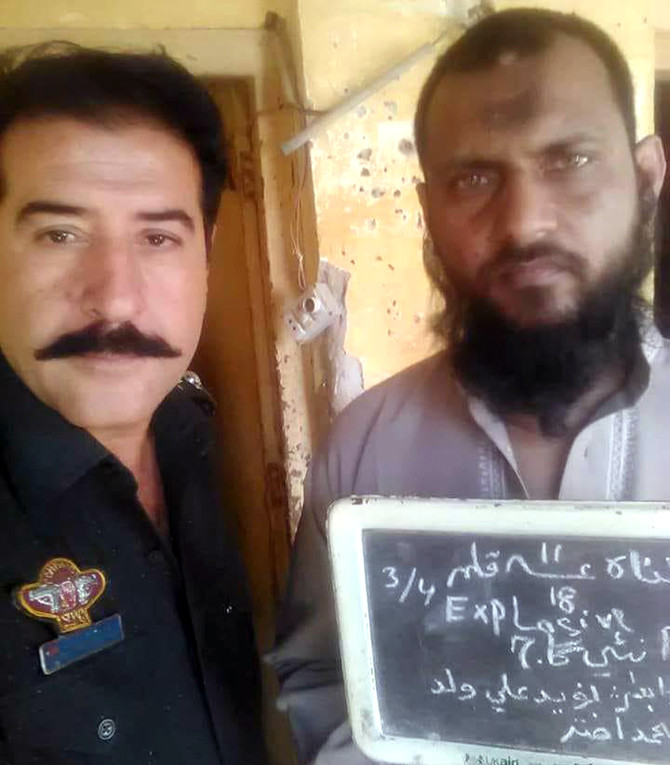KARACHI: Police in Pakistani city of Hyderabad announced today that they had arrested a high-value Al-Qaeda operative.
The arrest took place last week from Dadu in a hilly area of Sindh province, a senior police officer told Arab News.
“Surveillance activities were already in full swing in Dadu — a town in Sindh that borders Balochistan — when the law enforcement agencies encountered Naveed Ali alias Sharif,” Hyderabad’s Senior Superintendent of Police Tanveer Hussain Tunio told Arab News.
“In the past, militants infiltrating through these routes have attacked Muharram processions and shrines, as a result security had already been stepped up,” Tunio said, explaining that the encounter was accidental, and that had Naveed entered the city unchecked a major catastrophe could have taken place.
“Naveed could have been traveling to Hyderabad, his native city, to visit his family, or perhaps to another city to meet men from Al-Qaeda sleeper cells,” Tunio said.
He hailed the arrest as a major victory against the international terrorist outfit.
“He [Naveed] is close associate of Tahir Minhas, mastermind of the Safoora incident (the bus attack in 2015 in which around 46 people were killed) and had been involved in dozens of target killings and terrorism in Hyderabad,” the official explained.
In 2014, Naveed, along with Tahir Minhas and other members of Al-Qaeda, targeted police vans, killing four policemen. Tunio added that Naveed carried a Rs2.5million bounty on his head.
The Hyderabad police described Naveed as a high-value Al-Qaeda target. Raja Umar Khattab, head of the transnational terrorist intelligence group of the Counter Terrorism Department (CTD), who has interrogated several Al-Qaeda terrorists over the past decade, said the arrest was a significant breakthrough.
“Several Al-Qaeda terrorists being interrogated by the CTD have disclosed his name,” Khattab told Arab News, adding that Naveed had been referred to by his alias Sharif. “He is responsible for several attacks on law enforcement agencies. He is also responsible or many bank robberies in the province,” said the official.
Naveed Ali was a close aide of Al-Qaeda leaders Tahir Saeen and Hajji Abdul Qadir Baloch aka Hajji Baloch.
“In 2014, after developing differences with Hajji Baloch, Tahir Minhas set up his own Islamic State-inspired youth network, which on May 13, 2015, carried out the Safoora bus shooting in Karachi, killing more than 46 men and women of the Ismaili community,” Khattab said.
Naveed had sided with Hajji Baloch and conducted several activities in Hyderabad before fleeing to Afghanistan. Baloch, who is also Naveed’s mentor, reportedly joined Daesh in Afghanistan.
“Hardcore Taliban militant groups have been weakened, but the threat of groups such as Al-Qaeda in the Indian Subcontinent (AQIS) still loom,” said Saqib Sagheer, a senior journalist who has written about militancy in the city.
“They operate in smaller groups and use new names to dodge law enforcers,” Sagheer told Arab News.
SSP Omar Shahid Hamid, a senior counter-terrorism officer, believes that Al-Qaeda, being the ideologically and organizationally, the strongest of the terrorist outfits, is still likely to be a threat to the city despite the successes made by law enforcement agencies.
“The Al-Qaeda sleeper cells, however, still exist and since these cells work independently and one sleeper cell becomes active at a time, it’s hard to bust them all,” Shahid told Arab News.



















